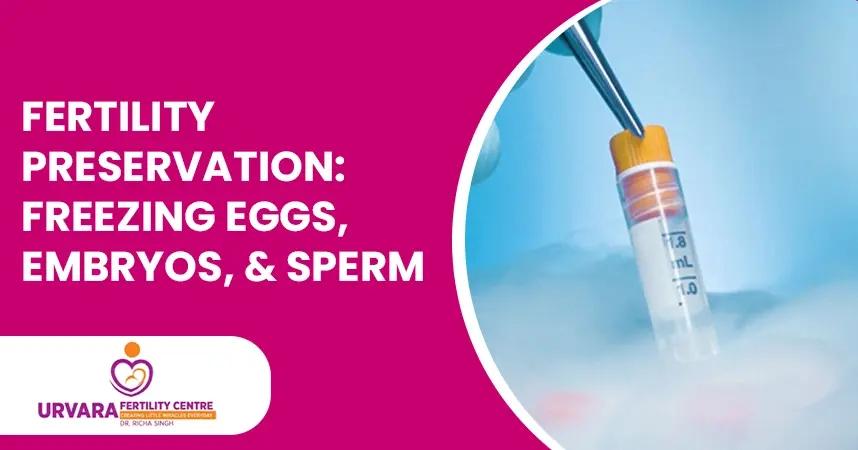
Fertility Preservation: Freezing Eggs, Embryos, and Sperm
Fertility preservation is a phenomenal option for individuals and couples who want to protect their ability to have children in the future. Whether you are planning a family later in life, facing a medical condition such as cancer, or simply want to safeguard your fertility options, this article is essential for understanding your options. We'll explain the basics of freezing eggs, embryos, and sperm, why these methods are important, how they work, and the benefits and risks associated with them.
By researching this topic, you will gain valuable information to make informed decisions about your reproductive health. Read on to learn about this life-changing technique and how it can help you on your family planning journey.
What is Fertility Preservation?
Fertility preservation refers to medical techniques that save or preserve eggs, sperm, or embryos for future use. It is a solution for individuals who may lose fertility due to aging, medical conditions, or treatments such as chemotherapy.
Why is Fertility Preservation Important?
-
Family Planning Flexibility: Fertility preservation allows a person to delay becoming a parent without worrying about a decrease in fertility.
-
Medical Necessity: People who are receiving medical treatment that may affect fertility may be able to preserve their ability to have biological children later.
-
Career and Lifestyle Choices: This provides an option for people who want to focus on their careers or other priorities before starting a family.
Read Also:- Fertility Preservation in Female Cancer Patients
Techniques of Fertility Preservation
1. Egg Freezing (Oocyte Cryopreservation)
Fertility preservation allows a person to delay becoming a parent without worrying about a decrease in fertility.
Steps in Egg Freezing:
-
Ovarian Stimulation: The hormonal medication stimulates the ovaries to produce multiple eggs.
-
Egg Retrieval: The eggs are removed through a minor surgical procedure.
-
Freezing: The eggs are frozen using advanced vitrification technology.
Who Should Consider Egg Freezing?
-
Women facing cancer treatments.
-
Women planning to delay pregnancy for personal or career-related reasons.
-
Those with a family history of early menopause.
2. Embryo Freezing
Embryo freezing is the process of storing fertilised eggs for future use. It is commonly used in IVF treatments.
Steps in Embryo Freezing:
-
Fertilization: Eggs are fertilized with sperm to create embryos.
-
Freezing: Viable embryos are frozen and stored.
Who Should Consider Embryo Freezing?
-
Couples undergoing IVF.
-
Individuals who want to preserve embryos for later use.
3. Sperm Freezing (Semen Cryopreservation)
Freezing sperm stores sperm for future fertility treatments.
Steps in Sperm Freezing:
-
Sample Collection: Sperm is collected through ejaculation or surgical extraction.
-
Freezing: The sample is treated with a cryoprotectant and frozen.
Who Should Consider Sperm Freezing?
-
Men undergoing medical treatments like chemotherapy.
-
Men with jobs involving high risk, such as military personnel.
-
Those with medical conditions affecting sperm quality.
Benefits of Fertility Preservation
-
Maintains Fertility Options: Ensures the ability to have biological children later in life.
-
Supports Medical Treatments: Provides peace of mind for individuals facing treatments like chemotherapy.
-
Increases Success Rates: Using younger eggs or embryos can improve the chances of successful pregnancies.
Risks and Limitations
-
Cost: Fertility preservation can be expensive and may not be covered by insurance.
-
No Guarantee: While success rates are high, pregnancy is not guaranteed.
-
Emotional Impact: The process can be emotionally taxing for some individuals.
Who Should Consider Fertility Preservation?
-
Cancer Patients: Treatments like chemotherapy can damage fertility.
-
People with Genetic Disorders: Conditions like Turner syndrome or Klinefelter syndrome may impact fertility.
-
Age-Related Fertility Decline: Women in their 30s or 40s who want to delay pregnancy.
-
Lifestyle Reasons: Individuals who want to focus on their career or other life goals before starting a family.
Read Also:- PCOD and PCOS: Know the Difference
How to Decide if Fertility Preservation is Right for You
-
Consult a Specialist: Talk to a fertility expert to assess your options.
-
Evaluate Costs: Understand the financial aspects, including storage fees.
-
Consider Timing: The earlier you act, the better your chances of success.
Frequently Asked Questions (FAQs)
Q1. How long can eggs, embryos, and sperm be stored?
They can be stored for years. Studies have shown that successful pregnancies can be achieved using eggs, embryos, and sperm stored for more than a decade.
Q2. Does freezing affect quality?
Advanced freezing techniques such as vitrification minimise damage and maintain high quality.
Q3. Is fertility preservation covered by insurance?
This depends on the country and the insurance provider. Some plans cover medical reasons such as cancer treatment, but not elective procedures.
Q4. What is the cost of fertility preservation?
Costs vary but usually include processing fees, storage fees, and medication costs.
Steps to Prepare for Fertility Preservation
-
Step 1: Schedule a consultation with a fertility specialist.
-
Step 2: Undergo fertility testing to evaluate your reproductive health.
-
Step 3: Follow medical advice and prepare for the procedure.
Conclusion
Fertility preservation is a powerful option for individuals and couples who want to secure their reproductive future. Whether you are facing medical challenges or planning to delay becoming a parent, it is important to understand the methods, benefits, and considerations. By consulting an expert and taking timely action, you can make informed decisions in line with your life goals.
Content Created By:

Cyberbizz Technologies
Team - Content Curator

